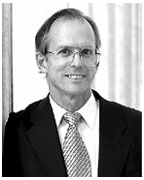
February 25, 2004: President's Page
|
William B. Russel |
Graduate Education — Going Strong
A. W. Marks ’19 Professor of Chemical Engineering William B. Russel was appointed dean of the Graduate School in 2002. I thought you would enjoy hearing from him in this issue that is being sent to all Graduate School alumni.—S.M.T.
Graduate education at Princeton actually started quite early—with James Madison as the first student in 1771—but it grew slowly until the 1950s. Since then, graduate programs have developed as an integral part of the University, of central importance to the faculty and increasingly linked to the undergraduate program. Now our students, through the research and teaching in which they are engaged, support and stimulate academic pursuits at Princeton quite broadly, from language tables for beginning students in the undergraduate colleges to international workshops in collaboration with faculty within the Oxford-Princeton partnership.
Let me give you an idea of the breadth, depth, and relevance of graduate research at Princeton through some of the dissertation topics of the outstanding graduate students who have been recognized with honorific fellowships for their final year of study. Among them are students in physics and astrophysics pondering the abstract theory of strings and strategies for detecting the mysterious dark matter. Engineers seek a new delivery system for DNA gene therapy in one wing of the Engineering Quadrangle and optimal distributions for wireless networks and mobile computing devices across the courtyard. Social scientists examine compassion as a motive for political morality in the Center for Human Values, while humanists explore the deeper implications of the “Liar” paradox in philosophy and the role of intellectuals in Iraq through Near Eastern studies.
To complement dissertation research and nurture the academic development of our students, the Graduate School offers funding to organize conferences, workshops, and other academic initiatives. Some are one-time events, such as the conference on Discipline Building: A Short History of the Ph.D. in Architecture. The brainchild of four students, this conference included panels on Architects vs. Historians, the Founding Programs, the Gatekeepers, and Intellectual Hospitality. Some are well-established annual events such as the Princeton-Rutgers Graduate Philosophy Conference, for which graduate students serve as organizers, jurors, speakers, and commentators, or the lecture series of the Graduate Engineering Council/Graduate Women in Engineering that brings alumni to campus to discuss their careers.
The Tribute to Teaching hosted by the Association of Princeton Graduate Alumni each spring salutes outstanding graduate student teachers. While some feel that great teachers are born, not made, I know that graduate students serving as assistants in instruction (AIs) benefit from and appreciate programs on the art of teaching offered by the McGraw Center for Teaching and Learning. Even more impressive performances may lie in the future as programs introduced recently by the center, such as the AI Orientation Workshop, a forum on Grading at Princeton, a Precept on Precepting, a Great Teachers on Teaching Series, and a Workshop on Teaching Portfolios, continue to grow in popularity.
The ambitious transformation of the undergraduate residential colleges now being planned offers an important opportunity to further integrate graduate students into the life of the University. The plan is to include about 10 graduate students as residents in each college to lend their disciplinary expertise and individual talents to cultural, academic, or performing arts programs. From my own experience living in a residential college as an undergraduate at Rice and at the Graduate School as dean, I appreciate the richness of the intellectual environment that comes from having faculty, visiting academics or practitioners, undergraduates, and graduate students meet informally on a regular basis.
Since we moved in last May, my wife, Priscilla, and I have enjoyed hosting graduate students at Wyman House, as did my predecessors beginning with Dean West. (One such encounter motivated the title of Richard Feynman’s *42 memoir, “Surely You’re Joking, Mr. Feynman!”) The annual dinner for the Whiting Fellows, ice cream socials, dinners with the dean, High Table, the reception before the holiday dinner, and House Committee meetings have allowed us to engage many residents of the Graduate College. At the monthly High Table an invited guest speaks to students and friends in Wyman House, then joins us for dinner in Procter Hall before returning to Wyman House for dessert and discussion. This fall our guests included Ambassador Robert Finn *82, who described his experiences in Afghanistan after the fall of the Taliban, and Professor of Classics Josiah Ober, who spoke about advising McKinsey & Co. on what the Athenian democracy can teach corporate leaders about creating great organizations.
The lively give and take of ideas following the dinners illustrates the
intellectual substance of this gifted and passionate group of Princeton
students. By educating them, we educate the leaders of the future, leaders
who will ensure that higher education, the pursuit of knowledge at the
frontiers of human endeavor, and the application of that knowledge to
the betterment of society will continue. Truly this is an important aspect
of Princeton in the nation’s service and in the service of all nations!
![]()

